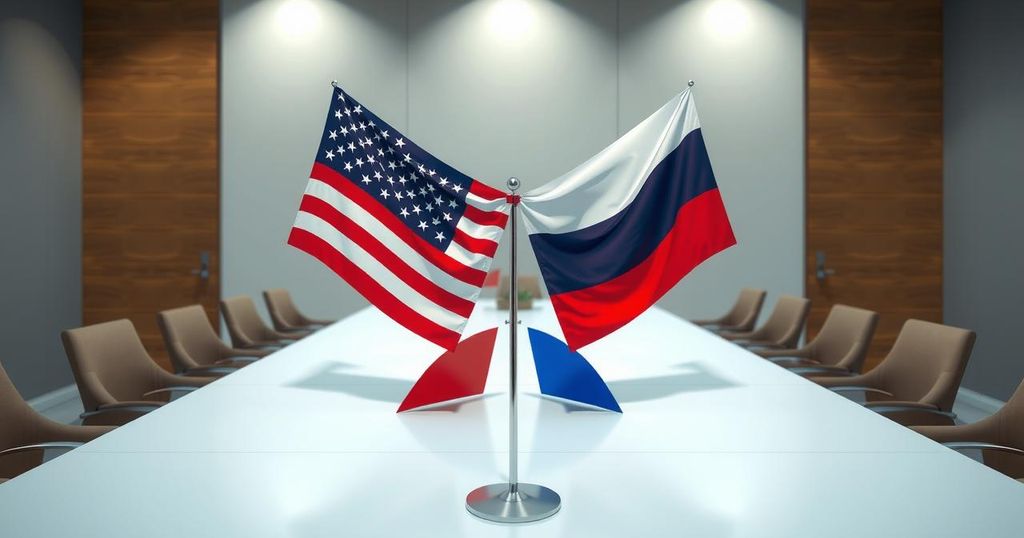Conflicts
Politics
ASIA, DIPLOMACY, DIRIYAH PALACE, DONALD TRUMP, EUROPE, EUROPE/ASIA, EVELYN HOCKSTEIN, FAISAL BIN FARHAN AL SAUD, FLA, INTERNATIONAL RELATIONS, MAR - A - LAGO, MARCO RUB, MARCO RUBIO, MIKE WALTZ, MO, MOSAAD BIN MOHAMMAD AL - AIBAN, MOSCOW, NORTH AMERICA, PALM BEACH, POOL PHOTO, PRINCE, RIYADH, RUBIO, RUSSIA, RUSSIAN INVASION OF UKRAINE, SAUDI ARABIA, SERGEI LA, SERGEI LAVROV, SERGEY LAVROV, STEVE WITKOFF, TRUMP, U. S, U. S. MIDDLE EAST, U. S. SECRETARY, UKRAINE, UNITED STATES, US, VLADIMIR PUTIN, WAR, WASHINGTON, YURI USHAKOV
Sophia Klein
U.S.-Russia Dialogue on Ukraine Peace Involves Controversial Claims and Diplomatic Renewal
Recent U.S.-Russia talks in Riyadh aim to negotiate peace in Ukraine, with Secretary of State Marco Rubio and Foreign Minister Sergey Lavrov forming agreements to rekindle diplomatic relations. President Trump suggested Ukraine is partly to blame for the conflict, raising concerns about U.S. alliances. High-level working groups will be established to discuss conflict resolution, though Ukraine’s exclusion from talks is contentious.
A significant shift in U.S. foreign policy is underway as negotiations between American and Russian officials aim to conclude the ongoing war in Ukraine while enhancing diplomatic and economic relations. Recent discussions held in Riyadh, Saudi Arabia, led by U.S. Secretary of State Marco Rubio and Russian Foreign Minister Sergey Lavrov, culminated in agreements to reopen respective diplomatic missions in Washington and Moscow, though Ukraine remained uninvited to the talks.
President Donald Trump has attributed some blame for the conflict to Ukrainian leaders, suggesting they failed to prevent the war by not making prior concessions to Russia. His remarks reflect a controversial stance that may impact relations with Ukraine and alliances with Europe, diverging from previous U.S. policies that focused on isolating Russia and supporting Ukraine.
During a four-hour meeting in Riyadh, officials from both nations discussed reclaiming their diplomatic roles and expediting the appointment of ambassadors, following years of strained relations. The backdrop of historical tensions includes diplomatic expulsions and accusations dating back to events in Crimea and the poisoning of a Russian spy in the U.K.
As part of the efforts to restore collaboration and address the conflict in Ukraine, high-level working groups will be established to explore potential resolutions. Discussions are expected to involve critical topics such as territorial adjustments and security guarantees, although the feasibility of NATO peacekeeping troops in Ukraine remains contentious for Russia.
The exclusion of Ukraine and European representatives from the Riyadh discussions has raised concerns, particularly from Ukrainian President Volodymyr Zelenskyy, who expressed frustration over being left out. U.S. officials have assured that there will be consultations with Ukraine and European partners as the negotiations progress, emphasizing the importance of inclusive dialogue.
The possibility of easing U.S. sanctions against Russia was also hinted at, with Secretary Rubio indicating that mutual concessions would be necessary to conclude the conflict. Moreover, ideas for potential joint energy projects have been proposed, reflecting a mindset towards increased cooperation that could benefit both nations and the global community.
In conclusion, the recent high-level discussions between U.S. and Russian officials signal a potential thaw in relations and a move towards resolving the conflict in Ukraine. Although voices within Ukraine express concern over being sidelined, the commitment to engage in dialogue and restore diplomatic missions illustrates a willingness on both sides to pursue peace. The outcomes of these negotiations may profoundly reshape international dynamics and influence future collaborations.
Original Source: apnews.com





Post Comment